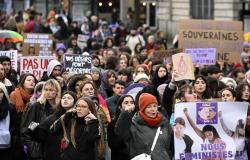Transcription of the first minutes of the podcast:
– “Sud Radio Bercov, in all its forms, face-to-face. » And today, in his face-to-face meeting, André Bercov receives the essayist David Duquesne, who has just published “Ne fait pas ton français” by Editions Grasset.
– And yes, itinerary of a bastard of the Republic. Hello David Duquesne.
– Hello André.
– So, David Duquesne, you have written a moving book, I must say.
– And finally, it's a book that speaks to you, it's a book that tells the story of your childhood.
– So, I'll remind you, but you'll tell it much better than me.
– You were born in 1970.
– 71.
– 71. So you are 53 years old, that's right.
– Exactly, yes.
– And you were born, I would say, without being ch'ti, you were born in the North, in the Corons.
– Finally, what we called the Corons.
– Alens, that's it.
– You had Fatima Lazar Benboili as a grandmother.
– Oui.
– And your grandmother, your mother, Ouria.
– Oui.
– That's what got you…
– And then, you are… And then, as a father, Serge Duquesne, who says that you haven't seen him since the age of 5, practically, that's it.
– And you tell, indeed, the North, you tell how you were raised, you tell the violence, the violence of parents, the violence of families, the violence of clans, and then also very pretty things, of solidarity or very strong things between you too.
– And then, you tell, indeed, you tell a little about all that.
– This is your life when you are at school, how it goes, the scenes you have witnessed.
– And I must say that, far from this chatter about cross-breeding, creolization, etc., multiculturalism, you have experienced it, but you have experienced it yourself, and you tell it completely differently.
– Differently, and that’s what struck me.
– In the good sense of the term, speeches which are usual political or ideological.
– I would like you to talk to me about that, about what you felt, very early on, in fact.
– Yes, I felt it very early, and I started writing on social networks in 2012, after the crimes perpetrated by Mohamed Merah, because what I was hearing did not correspond at all to the reality that I observed since my earliest youth.
– I wanted to bring back reality a little.
– This book, in fact…
– What came a little later is a mirror of French society, but over the last 70 years, to show, demonstrate the mutation that is taking place, which is an anthropological, demographic, cultural mutation and civilizational.
– We thus moved from republican meritocracy to the diversity preference, and we started from the national novel to arrive at Alfred Salouz, who is a little bit the national version of Alain Daly, Alfred Salouz, for whom Emmanuel Macron seems to have a nostalgia for a religious apartheid where Sharia law governed relations between Muslims and non-Muslims.
– Besides, we should reassure him, because Alfred Salouz is being realized in France, in many neighborhoods,…
AI-generated transcription






